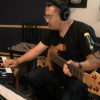Home » Jazz Articles » Album Review » Chris Trinidad: Chris Trinidad y Canción Tagalog
Chris Trinidad: Chris Trinidad y Canción Tagalog
The musician credits on its inner jacket list instruments with quite curious names, including three types of bata drums (okonkolo, itotele and iya) plus bombo and guagua among the percussion instruments, and with bandurria and octavina among the stringed and strummed ones.
But the strangely quiet, beautiful music these instruments render sounds so much more meaningful than the strange sound of their names.
"On this particular album," Trinidad writes in his notes, "I wanted to musically investigate my identity as a Tagalog-speaking Filipino-Canadian while continuing to explore Afro-Cuban music.
"Could there be a musical bridge between the Philippines and Cuba given their shared Spanish colonial history? This project is my artistic response to those questions."
Trinidad's words claim that Cancion Tagalog brings together two separate things, but his music sounds a singular, seamless vision and voice. This doesn't sound like a cross-cultural experiment. It sounds vibrant and alive, and consistently beautiful.
"Lamig Ng Umaga (Cold Fall Morning)" paints a picture of its title quite bright and clear. Trinidad's bass gently nudges the violin and flute forward through the first few verses, and then everyone steps back except for Trinidad and percussionist Raphael Geronimo. A rare bass solo from the leader softly considers and renders each note in a thoughtful sound, and then ends with a gentlemanly bow as it steps back behind the violin and flute again. (Trinidad reprises this song from his 2008 debut Common Themes I.)
"Taal (The Isle of Enchantment)" adds Raquel Berlind's bewitching lead vocal, which seems to grow more beautifully clear (almost transparent) when she raises its volume to help the guitar and bass pull the rest of the music into a swirling whirlpool of trancelike chanting and groove.
Trinidad solos so rarely that they seem worth special mention. "Kay Lungkot Nitong Hating Gabi (How Lonely Is This Midnight)" spotlights Trinidad's bass and octavina (guitar) with Bo Razon's bandurria (lute). Trinidad's bass leads the music with a strong feeling of tango, kind of how Jack Casady's bolero bass line frames "White Rabbit."
"Ang Tangi Kong Pag Ibig (My Only Love)" frames a similar dance between bass and guitar but accompanied by percussion, which eventually clears the floor for one more Trinidad bass solo, thoughtful and deep. "I take a rare bass solo and do my best imitating the melodic ingenuity of some of my bass guitar heroes Pedro Aznar, Tony Levin and Steve Swallow," Trinidad explains. Trinidad certainly pulls through the strong melodicism of Swallow and Aznar, with Levin's influence more inscrutable; more importantly, his bass tones reflect and complement the other instruments' sound like the brushstrokes of a master painter.
Track Listing
Alin Mang Lahi; Mutya Ng Pasig; Ang Tangi Kong Pag Ibig; Jocelynang Baliuag; Sampaguita; Sa Ugoy Ng Duyan; Kay Lungkot Nitong Hating Gabi; Iyo Kailan Pa Man; Taal; Lamig Ng Umaga; O Ilaw; Bayan Ko
Personnel
Chris Trinidad
bassBo Razon
multi-instrumentalistRaphael Geronimo
percussionCarlos Caro
percussionDavid Lechuga-Espadas
guitarJohn Calloway
fluteReggie Padilla
saxophone, tenorKimwell Del Rosario
violinMary Grace Del Rosario
violaRaq Filipina
vocalsAlbum information
Title: Chris Trinidad y Canción Tagalog | Year Released: 2020 | Record Label: Iridium Records
Tags
PREVIOUS / NEXT
Support All About Jazz
 All About Jazz has been a pillar of jazz since 1995, championing it as an art form and, more importantly, supporting the musicians who make it. Our enduring commitment has made "AAJ" one of the most culturally important websites of its kind, read by hundreds of thousands of fans, musicians and industry figures every month.
All About Jazz has been a pillar of jazz since 1995, championing it as an art form and, more importantly, supporting the musicians who make it. Our enduring commitment has made "AAJ" one of the most culturally important websites of its kind, read by hundreds of thousands of fans, musicians and industry figures every month.























